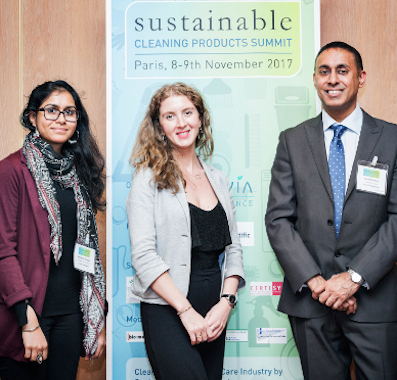 Cleanzine: your weekly cleaning and hygiene industry newsletter 18th April 2024 Issue no. 1110
Cleanzine: your weekly cleaning and hygiene industry newsletter 18th April 2024 Issue no. 1110
Your industry news - first
The original and best - for over 20 years!
We strongly recommend viewing Cleanzine full size in your web browser. Click our masthead above to visit our website version.
Sustainable Cleaning Products Summit highlights key industry concerns
 Some of the pressing sustainability issues facing the cleaning products industry, were discussed at the 4th edition of the Sustainable Cleaning Products Summit hosted in Paris last month.
Some of the pressing sustainability issues facing the cleaning products industry, were discussed at the 4th edition of the Sustainable Cleaning Products Summit hosted in Paris last month.
Discussions over the two-day executive summit covered the role of green certification schemes, bio-based surfactants, sustainability & marketing developments, and green formulations.
Amarjit Sahota, founder and president of Ecovia Intelligence, kicked off the event with a workshop on green labelling schemes. Amarjit believes that the high incidence of greenwashing is partly due to lack of accepted definitions of natural and sustainable terms for detergents and cleaning products. Voluntary schemes like EU Eco-Flower and Ecocert are becoming popular, enabling brands to legitimise their marketing claims.
However, an issue is adoption rates, with less than 1% of cleaning products having natural certification. Take-up rates for Nordic Swan and EU Eco-Flower are higher, although they are mainly adopted in northern Europe.
Professor Krister Holmberg from Chalmers University of Technology gave a workshop on bio-based surfactants. The Professor explained how various types of feedstock can now be used to make such surfactants and went through the different processes that are commonly used, such as fermentation, enzymatic, and organic chemical processes.
In her keynote presentation, Agathe Derain from Pur Project showed how the rise of the ethical consumer is making green products - like organic foods - to break from their niche status to mainstream. She called for greater transparency from brands and a 'sustainable lifestyle' whereby consumers use products more responsibly.
A similar sentiment was expressed by Saskia van Gendt from Ecover which has the 'Compass of Clean' approach to sustainability. The company focuses on human health, environmental health, and packaging health.
Julius Rutherfoord gave some insights into the sustainability challenges faced by professional cleaning companies, whilst Lene Stiil from Allergy Certified, outlined possible allergens in home care products. A number of personal care & home care companies are adopting the certification scheme because of the rising incidence of skin sensitivity and allergies.
Stephane Petitjean, director of GreenFlex, called for home care companies to rethink their value preposition. In light of rising conscious consumption, new products should be designed with sustainable materials and for long-term use.
The importance of recycling packaging materials was expressed by TerraCycle. The organisation is helping develop a circular economy by collecting packaging waste to design new products.
Dr. Aidan Lavery showed how his company Xeros Technology Group is reducing the environmental impacts of laundry cleaning. By the use of polymer technology, he explained how the water footprint of laundry can be reduced by 80% with his company's new washing machines.
In another paper, Biolin Scientific highlighted how its QSense application is being used to develop green home care products.
Peter Malaise from Meta.Consort Partnership gave an overview of the formulation hurdles when developing such products. He said the future of green cleaning products lay with sustainable detergents, which should be designed with end-of-life in mind.
The fourth Sustainable Cleaning Products Summit reiterated some of the sustainability shortcomings in the detergent & cleaning products industry. There is a need for sustainable detergents, made from plant-based feedstock and covering social & environmental aspects. There has been very low progress in green packaging. Consumer behaviour needs to be addressed if the ecological impact of cleaning products is to be reduced. Marketing and distribution is also an issue, especially for natural home care products.
Such issues will be discussed in the next edition of the Sustainable Cleaning Products Summit, scheduled for November 2018.
Image: The EI team, with Amarjit Sahota on the right
www.sustainablecleaningsummit.com
4th January 2018







